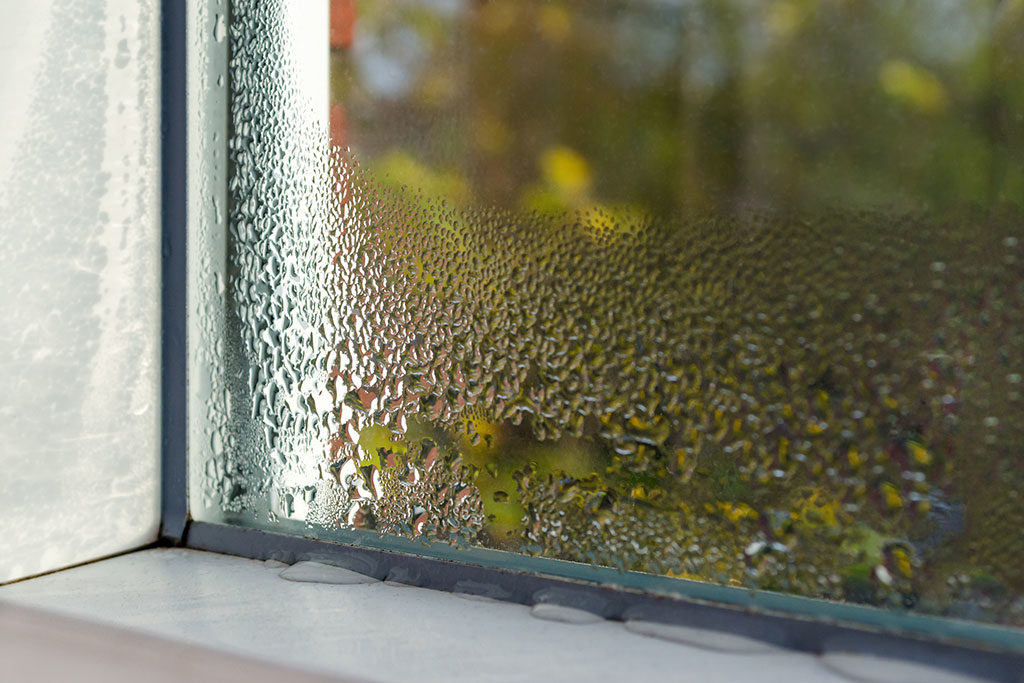Surprising Ways to Reduce Humidity in Your Home
Posted on by WestAIR Heating & Cooling

If you’ve been noticing foggy windows, musty odors, or clammy air throughout your home, chances are, your humidity levels are high. Humidity can both rob you of comfort and threaten your health. We don’t want you to suffer through the stifling heat, so we’ve outlined some surprising ways to reduce humidity in your home.
But first, a word about relative humidity (RH): RH measures water vapor relative to the temperature of the air. RH illustrates the amount of water in the air in relation to the total amount of humidity that could be held at the current temperature. Weather forecasts report relative humidity because it affects how we feel the temperature. Humid air feels warmer; dry air feels cooler. The ideal indoor relative humidity for a home is between 40 and 60 percent. If your RH is lower or higher, follow these tips:
Go old school with laundry
Dry your clothing outside. If you hang wet clothing inside to dry, all the moisture will evaporate into the air.
Accessorize with plants
Invest in some household tropical plants like Boston ferns, English ivies, Peace lilies, Reed Palms, or Tillandsias. These plants absorb moisture from the air instead of through the roots.
Take cold(er) showers
Hot showers create steam. Plan to bathe after exercising or spending time outside in the heat. You’ll be less tempted to jump into a steaming shower, and the cool water will feel refreshing. If nothing else, run the exhaust fan during and after showering.
Eat more salads
Hot weather provides the perfect opportunity to cook outside on the grill or eat cold meals like salads and sandwiches. Avoid boiling water; instead, save the heavy pasta for cooler weather. Your body will thank you in more ways than one.
Check the drainage route
In high humidity, your air conditioner or dehumidifier will produce a lot of condensation that has to go somewhere. Regularly empty the drip pan and be sure the drain lines are working properly so the water doesn’t evaporate back into the air.
Replace your flooring
Carpet is known to retain moisture. If you’ve tried all the above methods to decrease humidity, but still have a problem with moisture, consider replacing the carpet with hardwood flooring.
Benefits of proper humidity
With lower humidity levels, you could raise the thermostat setting a few degrees and still be comfortable. High humidity may cause headaches and asthma symptoms such as wheezing, shortness of breath, or a chronic cough. Proper humidity levels are easier on your respiratory tract and can:
- Reduce your cooling costs.
- Minimize wear on your HVAC system.
- Prevent dust mites, mold, bacteria, and mildew.
- Eliminate foul odors.
- Help you sleep better.
If you are still having trouble, consult with the professionals at WestAIR Heating & Cooling. We offer high-efficiency air conditioners to keep you cool in the muggy season and countless air quality accessories to reduce humidity. Schedule service to have a technician visit your home and recommend the right solutions for your family’s total indoor air comfort.
Contact us for more information.
This entry was posted in Air Conditioning,Cooling,Health Tips,Indoor Air Quality,Tips and tagged Air quality accessories, Asthma, Comfortable, Cooling, Dehumidifier, Energy efficiency, Energy savings, Grilling out, Humidity, HVAC, HVAC tips, Indoor air, Indoor air quality, Indoor air quality solutions, Muggy season
Indoor Air Quality Solutions
Posted on by WestAIR Heating & Cooling

Ever looked at a ray of light streaming through your windows and noticed floating dust particles? The sunlight can reveal a lot about a room’s air quality. While it may be tempting to open up the windows and doors for a quick fix, we’re in the thick of ragweed season, so it probably won’t do you any favors. The EPA recommends upgrading your HVAC filter or using an air cleaner to reduce harmful airborne particles. Read our blog to learn why and discover some more indoor air quality solutions.
New filters
Your HVAC filter traps microorganisms, animal fur, hair, lint, dander, mold, pollen, dirt, and more so they don’t accumulate in your system or irritate your lungs. Check your filter once a month to see if it needs replacing. A clogged air filter can cause your HVAC equipment to overheat, short cycle, or even break down. At the very least, changing a dirty filter could lower your energy bills because your system won’t have to work twice as hard just to obtain adequate airflow.
Air cleaner
An air cleaner uses a filter to trap particles like bacteria, mold, ragweed, pet dander, and dust mites. It can even eliminate viruses, kill germs, neutralize fumes, and remove odors. Those with allergies, asthma, or sensitivity to chemicals can benefit from an air cleaner, which can remove up to 97 percent of pollen-sized particles.
Air exchanger
Every time you cook, shower, clean, and breathe, you release pollutants into the air. Airtight buildings are more energy efficient, but they need to somehow circulate air to maintain a healthy environment. Without adequate ventilation, old air will sit in enclosed spaces and accumulate dust, bacteria, mold, and other harmful particles.
An air exchanger provides refreshed, filtered air to reduce these allergens. Air exchangers use two fans, one to take stale air out, and the other to pull in fresh air, run it through a filter, and disperse it through the ductwork.
Dehumidifier
Humidity makes a room seem hotter than it is and increases the likelihood of mold and mildew growth. Drier air feels cooler. A dehumidifier can increase your comfort and allow you to raise the temperature a few degrees to save on cooling expenses. You can use a portable unit or install a whole house dehumidifier that works in conjunction with your HVAC system.
Dehumidifiers pull moist air over a cooling coil that condenses the moisture vapor into droplets. Moisture along the coils drips into a collection pan or directly down a drain.
Duct cleaning
In most HVAC systems, all the conditioned air passes through ductwork to supply vents in each room, and back through return registers to be conditioned again. Particles floating in the air could become trapped in the many channels and crevices behind your walls. If the ductwork is dirty, your indoor air will be, too, no matter what air cleaning accessories you install. During air duct cleaning, your technician will use powerful vacuums and brushes to dislodge debris and allow proper airflow.
Bonus tip
Plants clean the air of carbon dioxide and can remove cancer-causing formaldehyde, benzene, and other toxins. If you are looking for an inexpensive way to purify your indoor air, bring in some potted vegetation. They can improve your physical health as well as your mental well-being by reducing stress, building memory retention, and increasing concentration, which in turn boosts productivity.
At WestAIR, we care about you and your family’s health and comfort. We offer air quality solutions to rid your home or business of harmful pollutants and provide fresh oxygen, day in, and day out.
Contact us to learn more.
This entry was posted in Duct Cleaning,Indoor Air Quality,Tips and tagged Air circulation, Air cleaner, Air filters, Allergies, Asthma, Clean HVAC ducts, Comfortable, Cooling, Energy efficiency, Energy savings, Humidity, HVAC, HVAC tips, Indoor air quality, Indoor air quality solutions
Subscribe to Our Blog
With RSS feeds, you don't have to visit our site everyday to keep up to date. Simply subscribe to our blog via RSS or Email and our posts will come to you!
Search Blog Posts
Categories
Archives
- April 2024 (1)
- February 2024 (1)
- January 2024 (1)
- February 2023 (1)
- January 2023 (1)
- December 2022 (1)
- November 2022 (1)
- October 2022 (1)
- September 2022 (1)
- August 2022 (1)
- July 2022 (1)
- June 2022 (1)
- May 2022 (1)
- April 2022 (1)
- March 2022 (1)
- February 2022 (2)
- December 2021 (1)
- November 2021 (1)
- October 2021 (1)
- September 2021 (1)
- August 2021 (1)
- July 2021 (1)
- June 2021 (1)
- May 2021 (1)
- April 2021 (1)
- March 2021 (2)
- January 2021 (1)
- December 2020 (1)
- November 2020 (1)
- October 2020 (1)
- September 2020 (1)
- August 2020 (1)
- July 2020 (1)
- June 2020 (1)
- May 2020 (1)
- April 2020 (1)
- March 2020 (1)
- February 2020 (2)
- November 2019 (1)
- August 2019 (2)
- June 2019 (1)
- May 2019 (1)
- April 2019 (1)
- March 2019 (1)
- February 2019 (1)
- January 2019 (1)
- December 2018 (1)
- November 2018 (1)
- October 2018 (1)
- September 2018 (1)
- August 2018 (2)
- July 2018 (1)
- May 2018 (1)
- April 2018 (1)
- March 2018 (1)
- February 2018 (1)
- January 2018 (1)
- December 2017 (3)
- November 2017 (2)
- October 2017 (2)
- September 2017 (2)
- August 2017 (1)
- July 2017 (2)
- June 2017 (3)
- May 2017 (2)
- January 2017 (4)
- November 2016 (1)
- September 2016 (3)
- July 2016 (2)
- June 2016 (2)
- May 2016 (4)
- April 2016 (1)
- March 2016 (2)
- February 2016 (2)
- January 2016 (1)
- August 2015 (1)
- July 2015 (1)
- June 2015 (3)
- May 2015 (1)
- July 2014 (2)
- June 2014 (1)
- April 2014 (1)
- March 2014 (1)
- February 2014 (2)
- October 2013 (1)
- May 2013 (1)
- March 2013 (1)
- February 2013 (1)
- August 2012 (1)
- July 2012 (2)
- June 2012 (2)
- May 2012 (2)
- March 2012 (1)
- February 2012 (1)
- December 2011 (1)
- November 2011 (1)
- October 2011 (1)
- September 2011 (1)
- August 2011 (1)
- June 2011 (1)
- May 2011 (1)
 Subscribe
Subscribe Subscribe
Subscribe